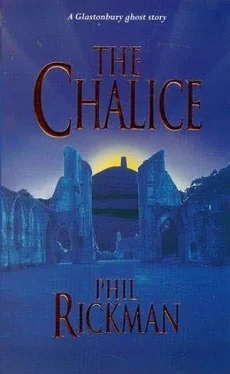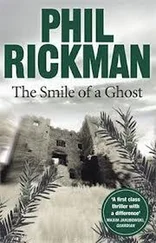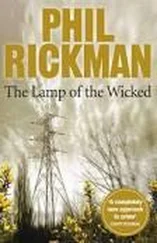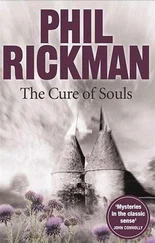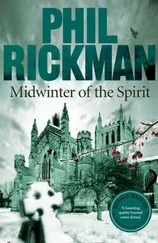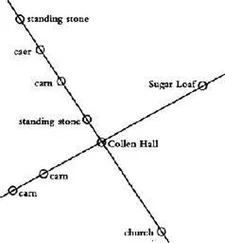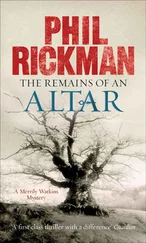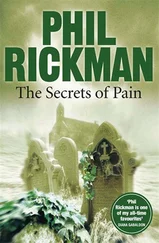Phil Rickman - The Chalice
Здесь есть возможность читать онлайн «Phil Rickman - The Chalice» весь текст электронной книги совершенно бесплатно (целиком полную версию без сокращений). В некоторых случаях можно слушать аудио, скачать через торрент в формате fb2 и присутствует краткое содержание. Жанр: Триллер, на английском языке. Описание произведения, (предисловие) а так же отзывы посетителей доступны на портале библиотеки ЛибКат.
- Название:The Chalice
- Автор:
- Жанр:
- Год:неизвестен
- ISBN:нет данных
- Рейтинг книги:5 / 5. Голосов: 1
-
Избранное:Добавить в избранное
- Отзывы:
-
Ваша оценка:
- 100
- 1
- 2
- 3
- 4
- 5
The Chalice: краткое содержание, описание и аннотация
Предлагаем к чтению аннотацию, описание, краткое содержание или предисловие (зависит от того, что написал сам автор книги «The Chalice»). Если вы не нашли необходимую информацию о книге — напишите в комментариях, мы постараемся отыскать её.
The Chalice — читать онлайн бесплатно полную книгу (весь текст) целиком
Ниже представлен текст книги, разбитый по страницам. Система сохранения места последней прочитанной страницы, позволяет с удобством читать онлайн бесплатно книгу «The Chalice», без необходимости каждый раз заново искать на чём Вы остановились. Поставьте закладку, и сможете в любой момент перейти на страницу, на которой закончили чтение.
Интервал:
Закладка:
An amber streetlamp reddened and Juanita looked up warily.
Diane dabbed her eyes with a tissue. 'I was wrong about the Pilgrims. They weren't terribly nice people at all. They made Headlice go into church backwards and they gave him drugs.'
'Quite.' Juanita tried not to think about sickles and animal masks. If only she could tell Diane precisely what the nice pilgrims had done to Jim and her. But a promise, unfortunately, was a promise.
'He had a horrible life,' Diane said. 'He just wanted… something he could believe in.'
'Don't we all.'
As they walked back to the shop, Juanita found herself thinking of Colonel Pixhill and fancied she could feel wings of foreboding overhead, like some shadow hang-glider.
NINE
Yesterday Joe Powys had been to Hereford library and got out everything they had on Uncle Jack Powys. He'd brought back as many books as he'd been allowed to; they were all spread out now on his desk back at the cottage, eight of them.
It was six fifteen a.m. He'd awoken in the dark thinking about it, a little scared. Uncle Jack. Uncle bloody Jack?
Where did this come from? You grow up assuming a certain kinship with one of the greatest literary figures of the twentieth century, there has to be a reasonable basis for it.
But the more Joe Powys investigated, the more he found that there wasn't.
Last night he'd called up relatives he hadn't spoken to since he was a kid. Joe. Joe Powys. P-O-W… your cousin. That's right, Mary's son…'
Feeling embarrassed as hell now. Arnold the dog sitting by his chair, laughing at him, the way he did, with his orb-like brown eyes.
None of the relatives had heard of any kind of link with John Cowper Powys. None of them remembered it being a family name So he was the only one of them with the surname Powys? What did that say?
'I know what you're thinking, Arnold,' Powys said, 'I suggest you forget it.'
Arnold kind of shrugged, lay down and lowered his head to his paws.
One of the relatives had said. All I remember, Joe, is for a long time we thought you must be Len's boy. Auntie Mary never discussed it.
What his mum used to tell him was that his father had messed around with bad women and they'd got divorced when he was a baby, and Uncle Jack had looked after them until Len came along. Later, Powys had figured that his mother and father had never been married at all, but he didn't push it, never searched out his birth certificate – pretty sure he'd find out he was registered under his mum's maiden name. Not Powys.
She used to talk about Uncle Jack until he was maybe ten. He had memories of books by JCP on the shelves when he was small, but not when he was old enough to read them with any understanding. His mum, in later years, read only magazines, and when he visited her two years before she died even the shelves had gone. Now Len was dead too.
That last time, when he'd asked his mother who was Uncle Jack and she'd looked blank, he'd smiled and not pushed it – what did it matter anyway? True, John Cowper Powys had lived not that far from Wrexham in the last part of his life. True, his mother had been a district nurse who'd moved around Merseyside and North Wales and might well have encountered the old bloke, maybe even nursed him.
'Old' being the key word here. JCP, born in the 1870s, had been very old when Joe was born. It really didn't seem at all likely that John Cowper Powys was his father.
Over the years Powys had tossed around a few more likely explanations. Say Mum arrives back in Wrexham with an illegitimate baby and she needs a name for him, and there on the shelf is some book by John Cowper Powys. Which is a nice name and doesn't sound phoney, and so maybe she becomes 'Mrs Powys' until she marries Len.
So the baby who should have been Joe Morris becomes Joe Powys. By the time she marries Len, he's nearly five years old and is used to the name, maybe can't get his mouth so easily around Devereaux, which is Len's name. And because it was JCP who saved her reputation when the chips were down. Mum retains a soft spot for the old guy, and the legend of Uncle Jack, the benefactor, is born.
It's a persistent kind of myth. Joe likes it. And when he comes to write a book about mystical aspects of the British countryside, which turns out to be a minor bestseller, and people ask him if by any chance he's descended from one or other of the famous literary siblings, Theodore, Llewellyn and John Cowper Powys, he… well, he doesn't deny it. And Ben Corby never asked in case the answer was the wrong one.
None of which explained the incidents of the book in the night.
Powys was afraid of ghosts. He didn't used to think he was. He believed in them, believed they were just beyond the boundaries of human understanding, and only just. He used to believe in the tape-recording theory of ghosts: that they were emotional imprints on the atmosphere, events replaying themselves over and over.
Therefore ghosts were harmless.
Harmless, harmless, harmless.
Around nine a.m., Joe looked up from JCP's Autobiography, in which Uncle Jack confesses early on to being some kind of sado-masochist – hence the tortured figure of the self- crucifying Welshman Owen Evans in A Glastonbury Romance.
Powys thought. Masochism?
And went to the phone, scrabbling in the desk drawer for his contacts book. He had misgivings about this, what he might be opening up. And having to endure the scorn, of course. But he made the call anyway.
And was lucky, as it happened. Brendan Donovan had just arrived at the university. Nine a.m. Too early, surely, for really withering rhetoric.
'OK, Powys,' Brendan Donovan said. 'I may possibly be able to accommodate a five-minute argument. The full half hour would require an appointment.'
Some years ago. Professor Brendan Donovan, of the Edinburgh University department of parapsychology, had reviewed the revised, mass-market paperback of The Old Golden Land for The Scotsman. Perhaps the most complimentary phrase in this review had been 'whimsical drivel'. Powys, unschooled in the etiquette traditionally observed between reviewer and reviewed, had telephoned Dr Donovan for a meaningful discussion. Others had followed over the years. Brendan Donovan had mellowed. Slightly.
'If you wish to discuss the spirit-path theory of ley-lines, with particular reference to linear anomalies in the Peruvian desert,' he said now, 'you'll find me a touch more amenable than I may have been regarding so-called earth-energies. Only a touch more, you understand, because ley-lines, of course, do not exist.'
'Poltergeists,' Powys said bluntly.
'Heavens,' Donovan said. 'My weak spot.'
'I know.'
'That is, Powys, so long as you do not attempt to try my patience by allowing any contentious words to intrude. Like, say, "ghost".'
'How about psycho-kinetic energy generated by a disturbed adolescent?'
'Well-trodden ground. Much safer.'
'In that case, how about psycho-kinetic energy generated by someone for whom adolescence is no more than a slightly feverish memory?'
'Like, who?' said Donovan.
'Like me.'
'Hmm,' Donovan said. 'Give me two minutes to summon a cup of fortifying coffee. I shall call you back.'
Well – let's be reasonable here – it wasn't Arnold, was it?
Nobody really knows what goes on down there. In the subconscious. Nobody knows what seeds planted in the psyche of a small child will start to germinate in the adult and with what effects.
OK. the trigger.
Joe Powys is alone, his woman has resumed her career, left him behind in a cottage in the sticks. Subconsciously, he knows she isn't coming back. His book has been rejected. And his home is not really his home; it's still Henry Kettle's, even though Henry is dead, because Henry had identity, which Joe doesn't have any more, maybe never did have.
Читать дальшеИнтервал:
Закладка:
Похожие книги на «The Chalice»
Представляем Вашему вниманию похожие книги на «The Chalice» списком для выбора. Мы отобрали схожую по названию и смыслу литературу в надежде предоставить читателям больше вариантов отыскать новые, интересные, ещё непрочитанные произведения.
Обсуждение, отзывы о книге «The Chalice» и просто собственные мнения читателей. Оставьте ваши комментарии, напишите, что Вы думаете о произведении, его смысле или главных героях. Укажите что конкретно понравилось, а что нет, и почему Вы так считаете.
